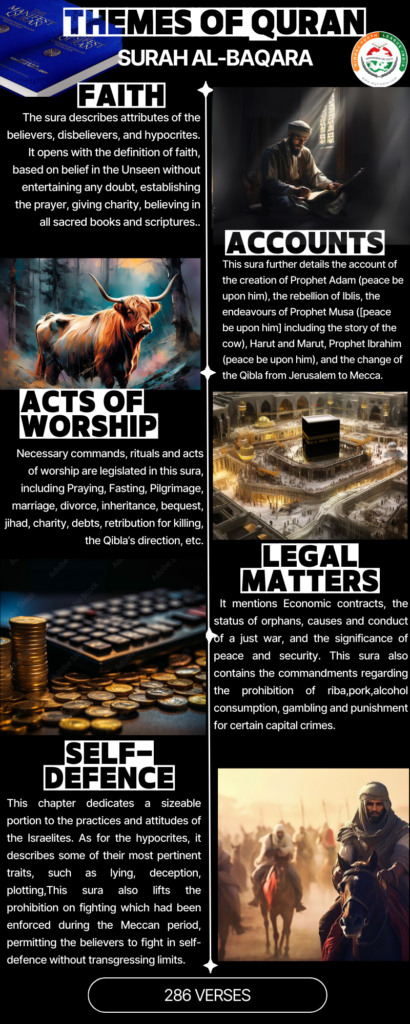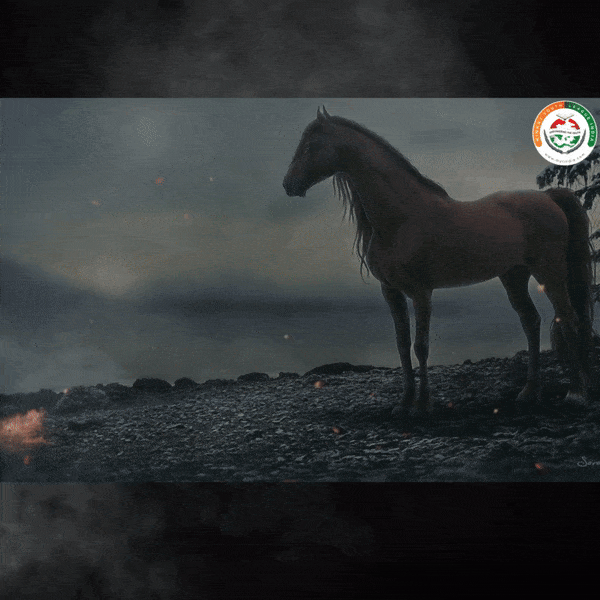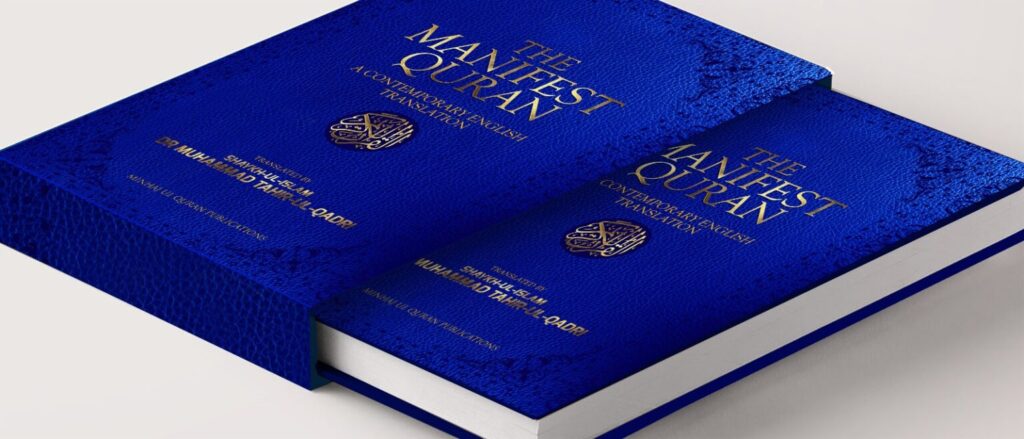al-Baqara is the 2nd sura of the Qur’an, which means ‘The Cow’. It takes its name from the story of the Cow in verses 67–71. It is also known as the Chapter of the Throne, the Peak of the Qur’an and the Chapter of the Brightness. It was the first Medinan sura, revealed after the migration of the Holy Prophet (blessings and peace be upon him). It is the 87th sura in chronological order, revealed after Surah al-Mutaffifin. It is the longest sura of the Qur’an, comprising 286 verses, 6,121 words, 25,500 letters, and 40 segments. After beginning with three Mysterious Letters of the Qur’an, the sura describes attributes of the believers, disbelievers, and hypocrites. It opens with the definition of faith, based on belief in the Unseen without entertaining any doubt, establishing the prayer, giving charity, believing in all sacred books and scriptures, revealed to the Holy Prophet Muhammad (blessings and peace be upon him) or the Prophets and Messengers (peace be upon them) before him (blessings and peace be upon him), and having sure and profound faith in Resurrection.
This sura further details the account of the creation of Prophet Adam (peace be upon him), the rebellion of Iblis, the endeavours of Prophet Musa ([peace be upon him] including the story of the cow), Harut and Marut, Prophet Ibrahim (peace be upon him), and the change of the Qibla from Jerusalem to Mecca.

Necessary commands, rituals and acts of worship are legislated in this sura, including Praying, Fasting, Pilgrimage, marriage, divorce, inheritance, bequest, jihad, charity, debts, retribution for killing, the Qibla’s direction, etc.
Other legal matters discussed are economic contracts, the status of orphans, causes and conduct of a just war, and the significance of peace and security. This sura also contains the commandments regarding the prohibition of riba, pork, alcohol consumption, gambling and punishment for certain capital crimes. This chapter dedicates a sizable portion to the practices and attitudes of the Israelites. As for the hypocrites, it describes some of their most pertinent traits, such as lying, deception, plotting, foolishness, mockery of Allah Almighty’s signs, corruption, ignorance and straying from the right path. This sura also lifts the prohibition on fighting which had been enforced during the Meccan period, permitting the believers to fight in self-defence without transgressing limits.
Regarding the merits and virtues of this sura, al-Bukhari has narrated in al-Sahih on the authority of Usayd b. Hudayr (may God be pleased with him), who said that he was reciting Surah al-Baqara at night while his horse was tied beside him; the horse was suddenly startled. When he stopped reciting, the horse calmed down, and when he restarted, the horse was startled again. Then he stopped reciting, and the horse calmed down (again). The next morning, he informed the Holy Prophet (blessings and peace be upon him), who said: ‘Recite, O Ibn Hudayr! Recite, O Ibn Hudayr!’ Usayd b. Hudayr (may God be pleased with him) replied: ‘O Messenger of Allah, my son Yahya was near the horse, and I was afraid that it might trample on him, so I raised my head and went to him. When I lifted my head towards the sky, there was something like a cloud containing what looked like lamps. So I went out to see it.’ The Holy Prophet (blessings and peace be upon him) said: ‘Do you know what it was?’ Usayd b. Hudayr (may God be pleased with him) replied: ‘No.’ The Holy Prophet (blessings and peace be upon him) said: ‘They were angels who had come nearer to you for your reciting (the Surah of Baqara). If you had kept on reciting it till morning, the people would have observed it, and this scene would not have disappeared from them.’

Imam Muslim has mentioned in al-Sahih, on the authority of Abu Hurayra (may God be pleased with him), that the Messenger of Allah (blessings and peace be upon him) said: ‘Do not render your homes graveyards. Surely, Satan flees from a home where Sura al-Baqara is recited.’ In another narration, the Messenger of Allah (blessings and peace be upon him) said: ‘Do not render your homes graveyards. Surely, Satan does not enter a home where Sura al-Baqara is recited.’
Some of the Qur’an’s most famous and abundantly recited verses are mentioned in this sura, including the Pedestal Verse (Aya al-Kursi) and the final two verses. al-Tirmidhi narrates from Abu Hurayra (may God be pleased with him), who said: ‘The Messenger of Allah (blessings and peace be upon him) said, ‘Everything has a peak, and the peak of the Qur’an is Sura al-Baqara, and it contains a verse that is the chief of all the Qur’anic verses—it is the Pedestal Verse (Aya al-Kursi, verse:255).’
Regarding the last two verses of the chapter, al-Bukhari and Muslim narrate on the authority of Abu Mas‘ud al-Badri (may God be pleased with him) who said: ‘The Messenger of Allah (blessings and peace be upon him) said, ‘The two verses from the end of Surah al-Baqara—whoever recites them at night, they will be sufficient for him.’

Reference :- Manifest Quran by Shaykh ul Islam Dr. Tahir ul Qadri


